Trimeresurus
| Trimeresurus | |
|---|---|

| |
| White-lipped pit viper, T. albolabris | |
| Scientific classification | |
| Domain: | Eukaryota |
| Kingdom: | Animalia |
| Phylum: | Chordata |
| Class: | Reptilia |
| Order: | Squamata |
| Suborder: | Serpentes |
| Family: | Viperidae |
| Subfamily: | Crotalinae |
| Genus: | Trimeresurus Lacépède, 1804 |
| Synonyms | |
Trimeresurus is a genus of pit vipers found in Asia from the Indian Subcontinent throughout Southeast Asia, China, and the Pacific Islands. Currently 44 species are recognized.[2] Common names include Asian palm pit vipers,[3] Asian lanceheads, and green pit vipers.[4]
Description
Most species in the genus Trimeresurus are relatively small, primarily arboreal species, with thin bodies and prehensile tails. Most Trimeresurus species are typically green in color, but some species also have yellow, black, orange, red, or gold markings.
Feeding
The diet of Trimeresurus species includes a variety of animals, including lizards, amphibians, birds, rodents, and other small mammals.
Reproduction
Like most viper species, many of the species in the genus Trimeresurus are ovoviviparous, bearing live young. However, some species such as T. flavoviridis, T. kaulbacki, and T. macrolepis are oviparous, laying eggs. Also, the reproductive biology of some Trimeresurus species is as yet unknown.
Venom
Trimeresurus venom varies in toxicity between species, but all are primarily hemotoxic and considered to be medically significant to humans.
Geographic range
Species in the genus Trimeresurus are found in Southeast Asia from India (including regions of the North Chotanagpur division of Jharkhand) to Southern China and Japan, and the Malay Archipelago to Timor.[1]
Species
| Image | Species[2] | Taxon author[2] | Subsp.*[2] | Common name[5] | Geographic range[1] |
|---|---|---|---|---|---|
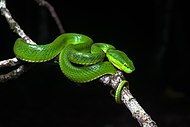
|
T. albolabris | Gray, 1842 | 0 | White-lipped pit viper | India (Assam), Nicobar Islands, Myanmar, Thailand, Cambodia, Laos, Vietnam, Southern China (Fujian, Hainan, Guangxi, Guangdong), Hong Kong, West Malaysia, Indonesia (Sumatra, Borneo, Sulawesi, Java, Madoera, Lombok, Sumbawa, Komodo, Flores, Sumba, Roti, Timor, Kisar, Wetar). |
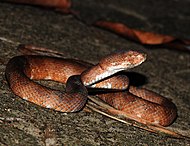
|
T. andersonii | Theobald, 1868 | 0 | Anderson's pit viper, Andaman pit viper | Andaman Islands, Nicobar Islands. |
| T. arunachalensis | Captain, Deepak, Pandit, Bhatt & Athreya, 2019 | 0 | Arunachal pit viper | India: Arunachal Pradesh | |
| T. calamitas | Vogel, Davi & Sidik, 2022 | 0 | Indonesia (Nias Island). | ||
| T. cantori | Blyth, 1846 | 0 | Cantor's pit viper | India: Nicobar Islands, and possibly the Andaman Islands. | |
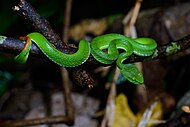
|
T. cardamomensis | Malhotra, Thorpe, Mrinalini & B. Stuart, 2011 | 0 | Cardamom Mountains green pit viper | Eastern Thailand, Koh Kong Province in Cambodia. |
| T. caudornatus | Chen, Ding, Vogel & S. Shi, 2020 | 0 | Ornamental-tailed pit viper | China (Yunnan). | |
| T. davidi | Chandramouli, P. Campbell & Vogel, 2020.[6] | 0 | Car Nicobar, India. | ||

|
T. erythrurus | Cantor, 1839 | 0 | Red-tailed bamboo pit viper | India (Assam and Sikkim), Bangladesh and Myanmar. |
| T. fasciatus | Boulenger, 1896 | 0 | Banded pit viper | Indonesia: Djampea Island. | |

|
T. flavomaculatus | Gray, 1842 | 2 | Philippine pit viper | Philippine Islands: Agutayan, Batan, Camiguin, Catanduanes, Dinagat, Jolo, Leyte, Luzon, Mindanao, Mindoro, Negros and Polillo. |

|
T. gracilis | Ōshima, 1920 | 0 | Kikushi habu | Central Taiwan. |

|
T. gumprechti | David, Vogel, Pauwels & Vidal, 2002 | 0 | Gumprecht's green pit viper | China (Yunnan), Laos, Thailand, Vietnam. |
| T. gunaleni | Vogel, David & Sidik, 2014 | 0 | Gunalen's pit viper | Sumatra. | |

|
T. guoi | Chen, S. Shi, Vogel & Ding, 2020 | 0 | Guo's green pit viper | China, Vietnam, Thailand, Myanmar. |

|
T. hageni | Lidth de Jeude, 1886 | 0 | Hagen's pit viper | Peninsular Thailand, West Malaysia, Singapore and Indonesia (Sumatra and the nearby islands of Bangka, Simalur, Nias, Batu and the Mentawai Islands. |
| T. honsonensis | L. Grismer, Ngo & J. Grismer, 2008 | 0 | Hon Son pit viper | Southern Vietnam. | |

|
T. insularis | Kramer, 1977 | 0 | Sunda Island pit viper, White-lipped island pit viper | Indonesia, Timor-Leste |
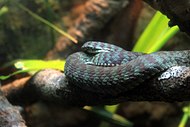
|
T. kanburiensis | M.A. Smith, 1943 | 0 | Kanburi pit viper | Thailand. |
| T. kirscheyi | Vogel, David & Sidik, 2022 | 0 | Simeulue pit viper | Indonesia (Simeulue Island). | |

|
T. kuiburi | Sumontha, Suntrarachun, Pauwels, Pawangkhanant, Chomngam, Iamwiriyakul & Chanhome, 2021 | 0 | Kui Buri pit viper | Thailand. |
| T. labialis | Steindachner, 1867 | 0 | Nicobar bamboo pit viper | India: Nicobar Islands. | |
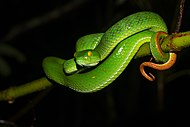
|
T. macrops | Kramer, 1977 | 0 | Large-eyed pit viper | Thailand, Cambodia and southern Vietnam. |
| T. malcolmi | Loveridge, 1938 | 0 | Malcolm's pit viper | Borneo. | |
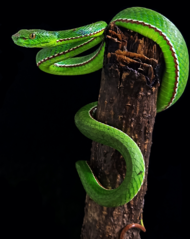
|
T. mayaae | Rathee, Purkayastha, Lalremsanga, Dalal, Biakzuala, Muansanga & Mirza, 2022[7] | 0 | Maya's pit viper | India: Meghalaya (Ri Bhoi), Mizoram (Champhai), Assam (Guwahati)[8] |
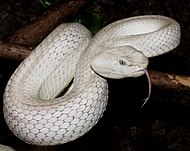
|
T. mcgregori | Taylor, 1919 | 0 | McGregor's pit viper, McGregor's tree viper, Philippine pit viper | Batan Island, Philippines. |

|
T. medoensis | Zhao, 1977 | 0 | Motuo bamboo pit viper | Northern India, northern Myanmar, and China (southeastern Xizang). |
| T. mutabilis | Stoliczka, 1870 | 0 | Central Nicobar pit viper, Central Nicobar bamboo pit viper | Central Nicobar Island. | |
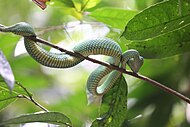
|
T. nebularis | Vogel, David & Pauwels, 2004 | 0 | Cameron Highlands pit viper, Clouded pit viper | West Malaysia (Cameron Highlands), Thailand. |
| T. phuketensis | Sumontha, Kunya, Pauwels, Nitikul & Punnadee, 2011 [9] | 0 | Phuket pit viper | Thailand: Phuket Island. | |

|
T. popeiorum | M.A. Smith, 1937 | 2 | Popes' pit viper | Northern India, Myanmar, Thailand, West Malaysia, Vietnam and Indonesia (Sumatra, the Mentawai Islands of Siberut, Sipora, and North Pagai, and on the island of Borneo). |
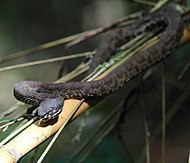
|
T. purpureomaculatus | Gray, 1832 | 0 | Mangrove pit viper | Bangladesh, Myanmar, Thailand, West Malaysia, Singapore and Indonesia (Sumatra). |
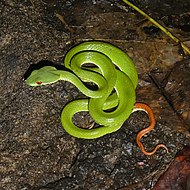
|
T. rubeus | (Malhotra, Thorpe, Mrinalini & L. Stuart, 2011) | 0 | ruby-eyed green pitviper | southern Vietnam and eastern Cambodia |
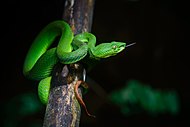
|
T. sabahi | Regenass & Kramer, 1981 | 0 | Sabah bamboo pit viper, Sabah pit viper | Sabah, Sarawak |
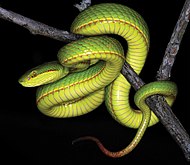
|
T. salazar | Mirza, Bhosale, Phansalkar, Sawant, Gowande & Patel (2020) | 0 | Salazar's pit viper[10] | India: western lowlands of Arunachal Pradesh |

|
T. schultzei | Griffin, 1909 | 0 | Schultze's pit viper | Philippines: Palawan and Balabac. |

|
T. septentrionalis | Kramer, 1977 | 0 | Nepal pit viper, Himalayan white-lipped pit viper | Bangladesh, India, Nepal |
| T. sichuanensis | Guo & Wang, 2011 | 0 | Sichuan pit viper | Sichuan, China | |

|
T. stejnegeri | Schmidt, 1925 | 2 | Stejneger's pit viper | India (Assam), and Nepal through Myanmar and Thailand to China (Guangxi, Guangdong, Hainan, Fujian, Zhejiang, Yunnan) and Taiwan. |
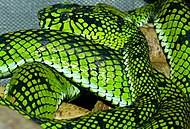
|
T. sumatranusT | Raffles, 1822 | 0 | Sumatran pit viper | Southern Thailand, West and East Malaysia (Sabah and Sarawak on Borneo) and Indonesia (Bangka, Billiton, Borneo, Sumatra and the nearby islands of Simalur, Nias, and possibly the Mentawai Islands [Sipora]). |
| T. tibetanus | Huang, 1982 | 0 | Tibetan bamboo pit viper | China: Xiang (Tibet) Autonomous Region. | |
| T. truongsonensis | Orlov, Ryabov, Thanh & Cuc, 2004 | 0 | Quang Binh pit viper | Central Vietnam | |

|
T. venustus | Vogel, 1991 | 0 | Beautiful pit viper, Brown-spotted pit viper | Southern Thailand |

|
T. vogeli | David, Vidal & Pauwels, 2001 | 0 | Vogel's pit viper | Cambodia, Laos, Thailand, Vietnam. |
| T. whitteni | Vogel, David & Sidik, 2022 | 0 | Siberut pit viper | Indonesia (Siberut Island). | |
| T. yingjiangensis | Chen, Ding, J. Shi & Zhang, 2019 | 0 | Southwest China | ||
| T. yunnanensis | Schmidt, 1925 | 0 | Yunnan bamboo pit viper | Southern China | |
| T. ciliaris | Idiiatullina, Pawangkhanant, Tawan, Worranuch, Dechochai, Suwannapoom, Nguyen, Chanhome & Poyarkov, 2023 | 0 | Limestone eyelash pit viper | Thailand |
*) Not including the nominate subspecies.
T) Type species.[1]
Taxonomy
Additional species that may be recognized by other sources include:[11]
- T. barati Regenass & Kramer, 1981. Commonly called Barat's bamboo viper, found in Indonesia.
- T. fucatus Vogel, David & Pauwels, 2004. Commonly called the Siamese peninsula pit viper and found in southern Thailand, Myanmar, Malaysia.
The genus Trimeresurus (sensu lato) has been the subject of considerable taxonomic work since 2000, resulting in the recognition of additional genera within this complex. Most authors now recognise the genus Protobothrops for the species cornutus, flavoviridis, jerdonii, kaulbacki, mucrosquamatus, tokarensis, xiangchengensis,[12][13][14] since these have been shown not to be closely related to other Trimeresurus in recent phylogenetic analyses.
In addition, Malhotra and Thorpe (2004)[13] proposed a radical shake up of the entire genus, splitting Trimeresurus into seven genera. Their proposed arrangement (including species described since 2004) is shown in the table below:
| Genus | Species included |
|---|---|
| Trimeresurus | andalasensis, borneensis, brongersmai, gramineus, malabaricus, puniceus, salazar, strigatus, trigonocephalus, wiroti |
| Cryptelytrops | albolabris, andersonii, cantori, erythrurus, fasciatus, honsonensis (Hon Son Pit Viper), insularis, kanburiensis, labialis, macrops, purpureomaculatus, rubeus, septentrionalis, venustus |
| Himalayophis | tibetanus |
| Parias | flavomaculatus, hageni, malcolmi, mcgregori, schultzei, sumatranus |
| Peltopelor | macrolepis |
| Popeia | barati, buniana, fucata, nebularis, popeiorum, sabahi |
| Viridovipera | gumprechti, medoensis, stejnegeri, truongsonensis, vogeli, yunnanensis |
This new arrangement has been followed by many,[14][15] but not all[11][16] subsequent authors.
David et al. (2011) considered some of the genera of Malhotra & Thorpe to be subgenera of the genus Trimeresurus, creating new combinations such as "Trimeresurus (Parias) flavomaculatus", "Trimeresurus (Popeia) popeiorum", "Trimeresurus (Viridovipera) stejnegeri", etc.[17]
Gallery
- A juvenile T. vogeli in Khao Yai National Park, Thailand
- Trimeresurus fucatus from Khao Sok National Park, Thailand
- Trimeresurus albolabris from Kaeng Krachan National Park, Thailand
- Trimeresurus gumprechti, Gumprecht's green pit viper, from Phu Hin Rong Kla National Park, Thailand
- Trimeresurus macrops from Khao Yai National Park, Thailand
- Trimeresurus popeiorum from Kaeng Krachan National Park, Thailand
See also
References
- ^ a b c d McDiarmid RW, Campbell JA, Touré T (1999). Snake Species of the World: A Taxonomic and Geographic Reference, Volume 1. Washington, District of Columbia: Herpetologists' League. 511 pp. ISBN 1-893777-00-6 (series). ISBN 1-893777-01-4 (volume).
- ^ a b c d "Trimeresurus ". Integrated Taxonomic Information System. Retrieved 27 September 2006.
- ^ Mehrtens JM (1987). Living Snakes of the World in Color. New York: Sterling Publishers. 480 pp. ISBN 0-8069-6460-X.
- ^ United States Navy (1991). Poisonous Snakes of the World. New York: U.S. Government / Dover Publications Inc. 203 pp. ISBN 0-486-26629-X.
- ^ Gumprecht A, Tillack F, Orlov NL, Captain A, Ryabov S (2004). Asian Pitvipers. First Edition. Berlin: GeitjeBooks. 368 pp. ISBN 3-937975-00-4.
- ^ Chandramouli, S. R.; Campbell, Patrick D.; Vogel, Gernot (1 November 2020). "A new species of green pit viper of the genus Trimeresurus [Lacépède, 1804] (Reptilia: Serpentes: Viperidae) from the Nicobar Archipelago, Indian Ocean" (PDF). Amphibian & Reptile Conservation. 14 (3): 169–176. Retrieved 9 November 2020.
- ^ Rathee YS, Purkayastha J, Lalremsanga HT, Dalal S, Biakzuala L, Muansanga L, et al. (2022) A new cryptic species of green pit viper of the genus Trimeresurus Lacépède, 1804 (Serpentes, Viperidae) from northeast India. PLoS ONE 17(5): e0268402. doi:10.1371/journal.pone.0268402
- ^ Karmakar, Rahul. "New species of venomous snake registered from Northeast". The Hindu. Retrieved 24 March 2022.
- ^ Sumontha M, Kunya K, Pauwels OSG, Nitikul A, Punnadee S (2011). "Trimeresurus (Popeia) phuketensis, a New Pitviper (Squamata: Viperidae) from Phuket Island, Southwestern Thailand". Russian Journal of Herpetology 18 (3): 11-17.
- ^ Mirza, Zeeshan A; Bhosale, Harshal S.; Phansalkar, Pushkar U.; Sawant, Mandar; Gowande, Gaurang G; Patel, Harshil (15 April 2020). "A New Species of Green Pit Vipers of the Genus Trimeresurus Lacépède, 1804 (Reptilia, Serpentes, Viperidae) from western Arunachal Pradesh, India". Zoosystematics and Evolution. 96 (1): 123–138. doi:10.3897/zse.96.48431. Retrieved 24 April 2020.
- ^ a b Trimeresurus at the Reptarium.cz Reptile Database. Accessed 2 February 2017.
- ^ Kraus F, Mink DG, Brown WM (1996). "Crotaline intergeneric relationships based on mitochondrial DNA sequence data". Copeia 1996: 763-773.
- ^ a b Malhotra A, Thorpe RS (2004). "A phylogeny of four mitochondrial gene regions suggests a revised taxonomy for Asian pitvipers (Trimeresurus and Ovophis)". Molecular Phylogenetics and Evolution 32: 83-100.
- ^ a b Castoe TA, Parkinson CL (2006). "Bayesian mixed models and the phylogeny of pitvipers (Viperidae: Serpentes)". Mol. Phylogenet. Evol. 39: 91-110.
- ^ Grismer LL, Grismer JL, McGuire JA (2006). "A new species of pitviper of the genus Popeia (Squamata: Viperidae) from Pulau Tioman, Pahang, West Malaysia". Zootaxa 1305: 1-19.
- ^ Vogel G (2006). Venomous Snakes of Asia / Giftschlangen Asiens. Frankfurt am Main: Terralog, Edition Chimaira.
- ^ David, Patrick; Vogel, Gernot; Dubois, Alain (2011). "On the need to follow rigorously the Rules of the Code for the subsequent designation of a nucleospecies (type species) for a nominal genus which lacked one: the case of the nominal genus Trimeresurus Lacépède, 1804 (Reptilia: Squamata: Viperidae)". Zootaxa 2992: 1-51.
Further reading
- Lacépède BG (1804). "Mémoire sur plusieurs animaux de la Nouvelle-Hollande dont la description n'a pas encore été publiée " [Memoir on several animals of New Holland whose description has not yet been published]. Annales du Muséum d'Histoire Naturelle, Paris 4: 184–211. (Trimeresurus, new genus, p. 209). (in French).






